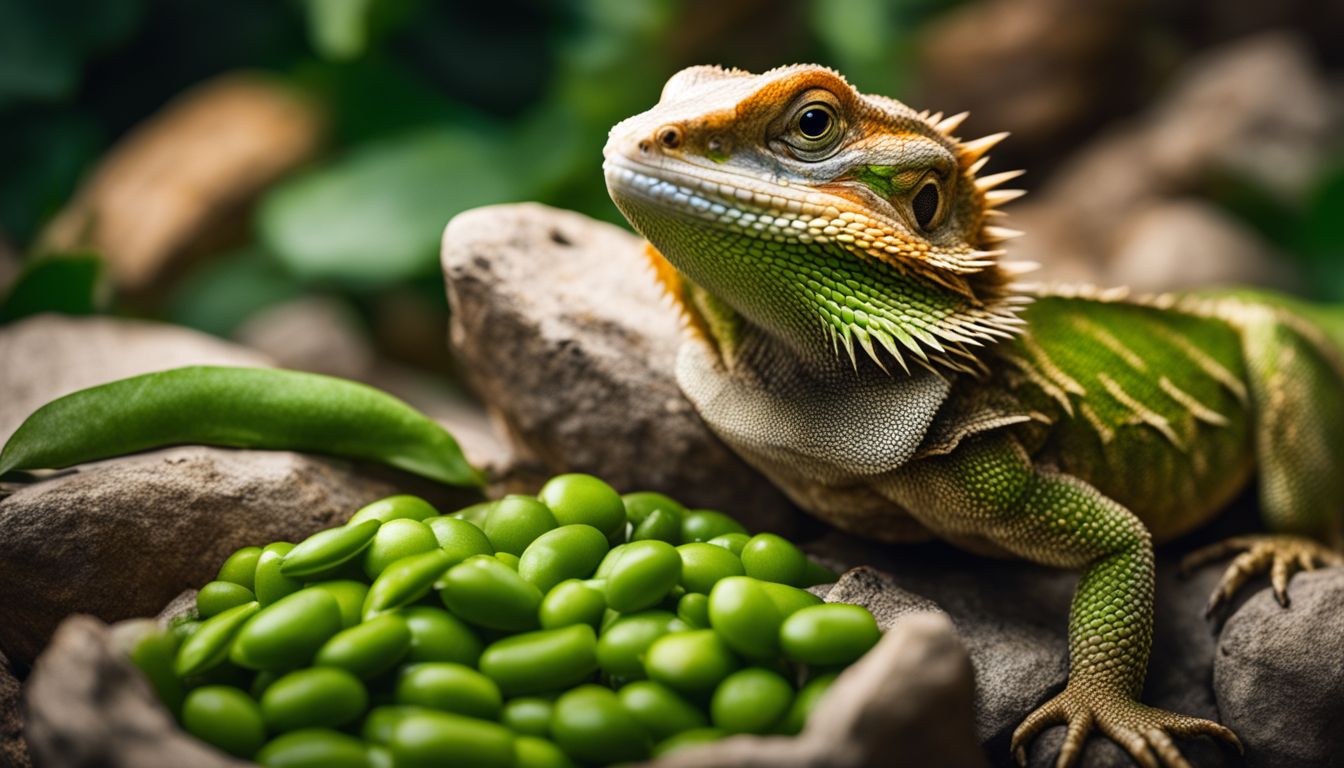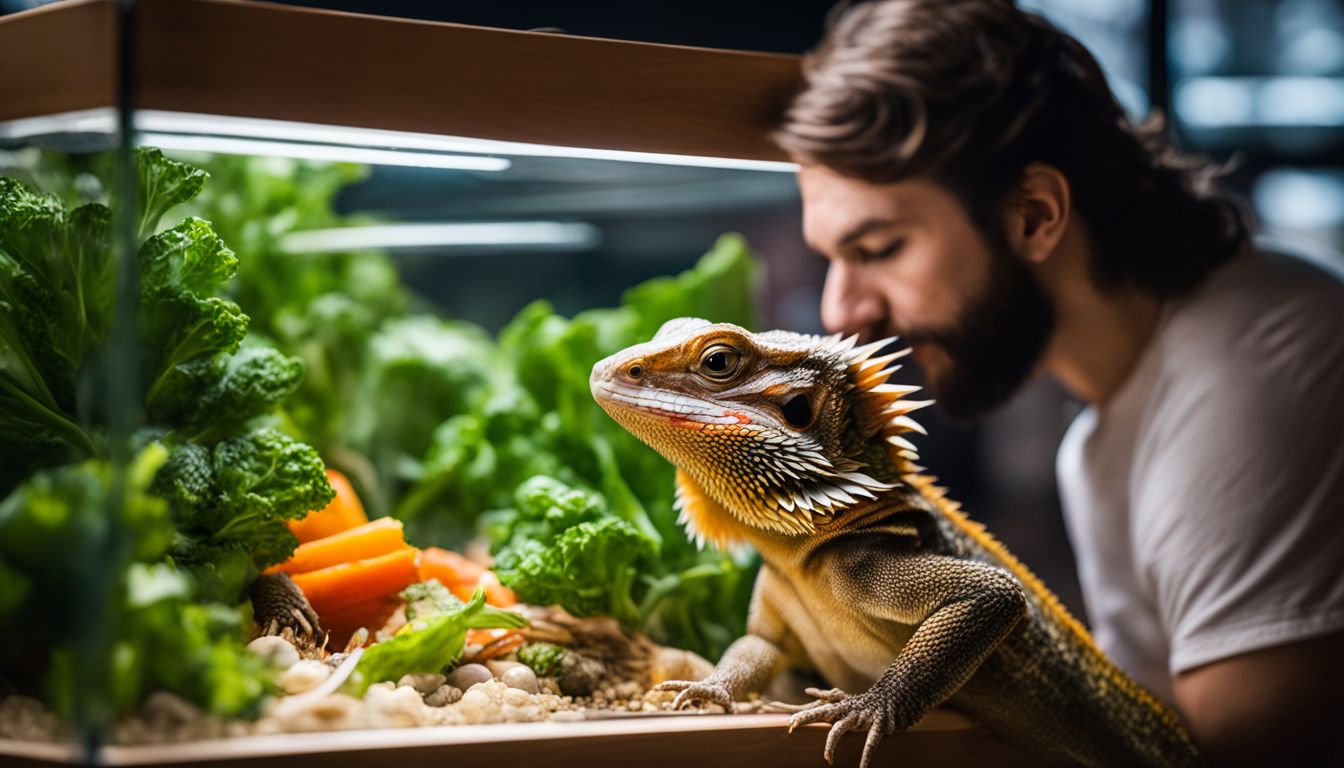Are you wondering if bearded dragons can eat edamame? It’s a fact that these reptiles enjoy a variety of veggies. This post will guide you through the dos and don’ts of feeding edamame to your scaly friend.
We’ll make sure your pet gets the nutrition it needs — safely. Keep reading for some surprising insights!
Understanding Edamame

Edamame might sound exotic, but it’s simply young soybeans still in their pods. These beans pack a punch of nutrients, making them a favorite snack for many. They’re high in protein, providing 12 grams per serving.
This makes edamame an interesting option for those looking to add variety to their diet—or in this case, the diet of a bearded dragon.
Beyond just protein, edamame offers fiber, vitamins, and minerals essential for good health. With 8 grams of fiber per serving, they support digestive wellness. Edamame also brings vitamin K and iron into the mix, with 98 µg of vitamin K and 5 mg of iron.
Plus, there’s vitamin B6 at 0.4 mg per serving. Understanding these nutritional facts is key before considering edamame as an occasional treat for your reptile friend’s menu.
Can Bearded Dragons Consume Edamame?

Yes, adult bearded dragons can eat edamame as an occasional treat. However, it’s not suitable for baby bearded dragons due to its high protein content.
Feeding edamame to adult bearded dragons
Adult bearded dragons can enjoy edamame as a special treat, not a staple food. This rule helps prevent nutritional imbalances. It’s wise to offer edamame no more than once a week. The reason is simple—edamame has an unbalanced ratio of calcium to phosphorus which might not meet the dietary needs of your scaly friend.
Providing edamame in moderation ensures that your adult bearded dragon gets a variety of nutrients without overdoing it. These green soybeans offer protein, fiber, and essential vitamins, supporting the overall health of your pet.
Always remember to maintain a balanced diet for bearded dragons that includes safe foods designed to meet their unique nutritional requirements.
Feeding edamame to baby bearded dragons
Feeding edamame to baby bearded dragons might seem like a nutritious choice, but it’s not the best idea. These young reptiles have specific dietary needs for proper growth and healthy development.
The main issue with edamame is its calcium-to-phosphorus ratio, which is unbalanced for juvenile bearded dragon diets. Calcium is crucial for bone health, while too much phosphorus can hinder calcium absorption.
Baby bearded dragons thrive on a balanced diet that promotes their growth and keeps their tiny bodies sturdy and active. Instead of edamame, focus on suitable bearded dragon food that meets all nutritional needs.
This includes feeder insects rich in calcium and vegetables that are safe and beneficial for them. Always choose foods that support healthy reptile development over those that could potentially interfere with it.
Potential Risks of Feeding Edamame to Bearded Dragons
Feeding edamame to bearded dragons can pose potential risks. Due to its high protein and phosphorus content, consuming edamame in large quantities may lead to health issues for these reptiles.
Furthermore, the tough pods of edamame can cause digestive problems for bearded dragons, especially if served without being shelled.
Edamame should only be offered sparingly and in moderation to avoid any adverse effects on the dragon’s health. It is crucial to maintain a balanced diet that meets their nutritional needs while minimizing the risk of digestive complications and other health concerns associated with excessive protein and phosphorus intake.
Be mindful of the serving size when offering edamame as a treat and prioritize vegetables that are easier for your beardie’s delicate digestive system such as bell peppers or squash.
Can Bearded Dragons Eat Jalapeños??
Other Safe Vegetable Alternatives for Bearded Dragons
Consider introducing vegetables like bell peppers, squash, and collard greens into your bearded dragon’s diet for a balanced nutritional intake – discover more safe options by reading the full blog!
Can Bearded Dragons Eat Jalapeños?
While bearded dragons can eat small amounts of jalapeños occasionally, too many can lead to digestive issues. It’s essential to introduce spicy foods like jalapeños in moderation and monitor for any adverse reactions.
Be mindful that a balanced diet with safe vegetables is crucial for maintaining your bearded dragon’s health. Opting for other safe vegetable alternatives over jalapeños is advisable to ensure a well-rounded and nutritious diet for your pet reptile.
Remember, not all vegetables are suitable for bearded dragons, so it’s important to research and choose their treats wisely. Exercise caution when introducing new foods into their diet, including spicy options like jalapeños.
Conclusion
In conclusion, while edamame can provide some protein and fiber for bearded dragons, it should only be offered occasionally as a treat. Be mindful of the need for a balanced diet that includes various protein sources and vegetables.
Moderation is key when it comes to feeding edamame to your bearded dragon. Remember to consult with a reptile veterinarian or experienced breeder if you have any concerns about your pet’s diet.
Always prioritize the overall health and well-being of your beloved bearded dragon when making dietary choices.
FAQs
1. Can bearded dragons eat edamame?
Yes, bearded dragons can eat edamame in moderation as part of a varied diet.
2. Are there any risks associated with feeding edamame to bearded dragons?
Feeding raw or unseasoned edamame to bearded dragons may pose a choking hazard and should be avoided.
3. How should I prepare edamame for my bearded dragon?
Edamame should be cooked and shelled before being offered to your bearded dragon.
4. What nutritional benefits does edamame provide for bearded dragons?
Edamame is rich in protein, fiber, and essential nutrients that can contribute to the overall health of your bearded dragon when fed in moderation.
5. How frequently can I feed edamame to my bearded dragon?
Offering edamame as an occasional treat rather than a regular part of their diet is recommended for the well-being of your pet reptile.




